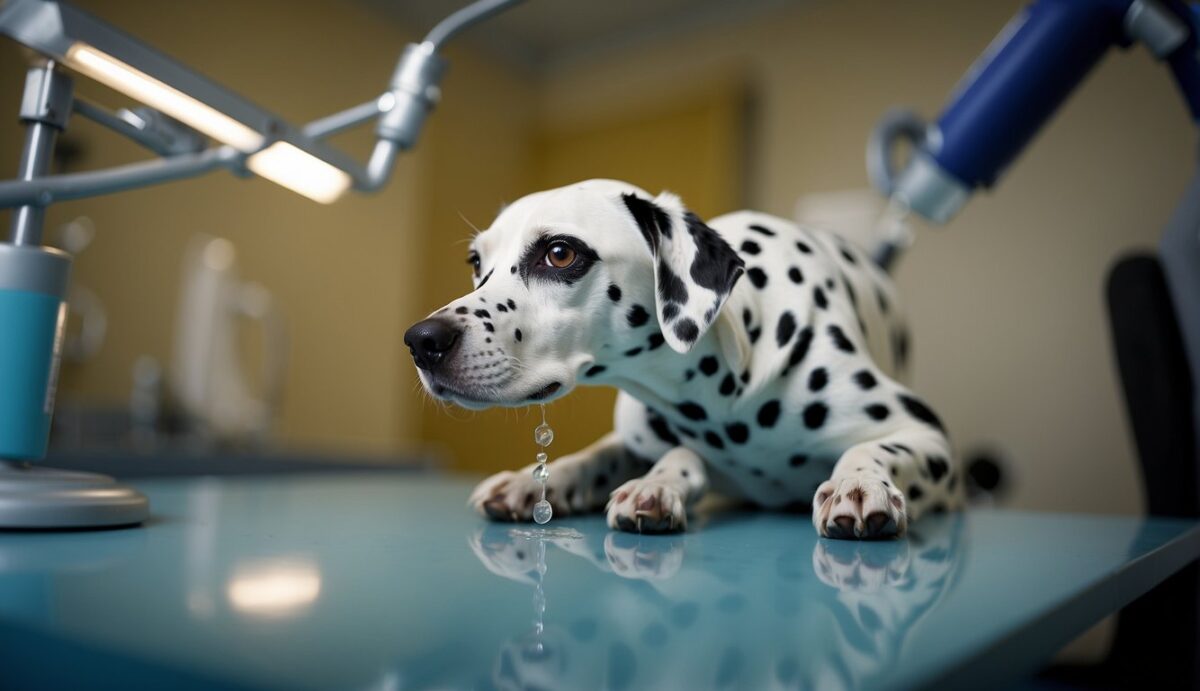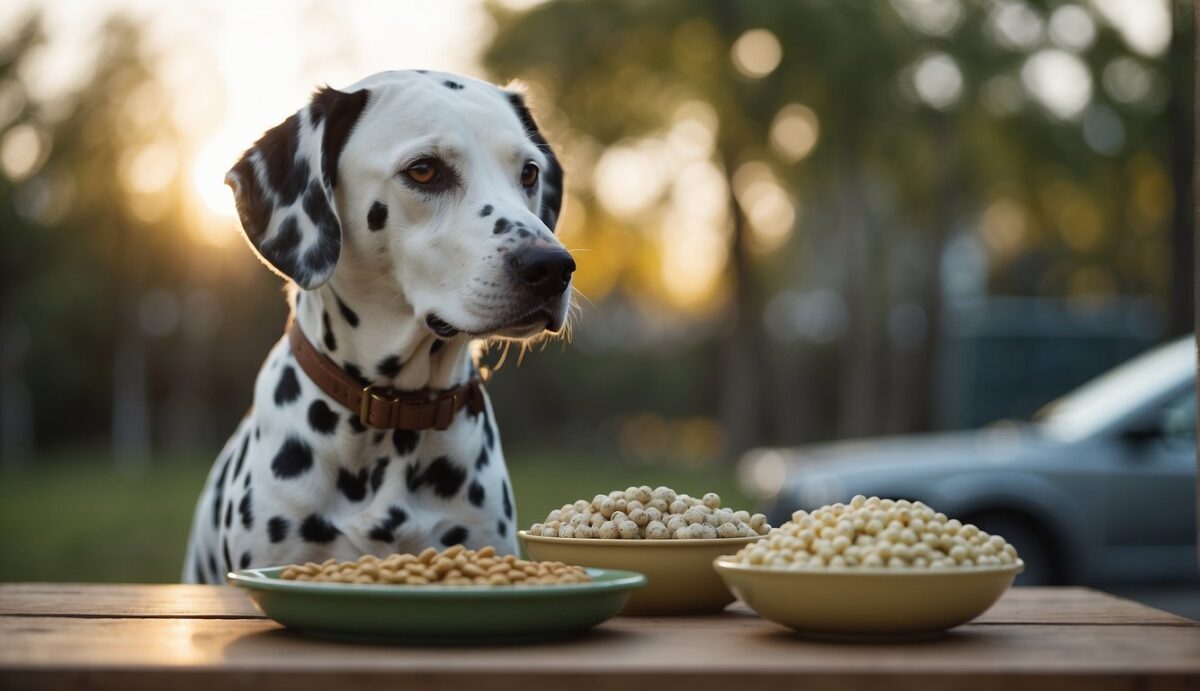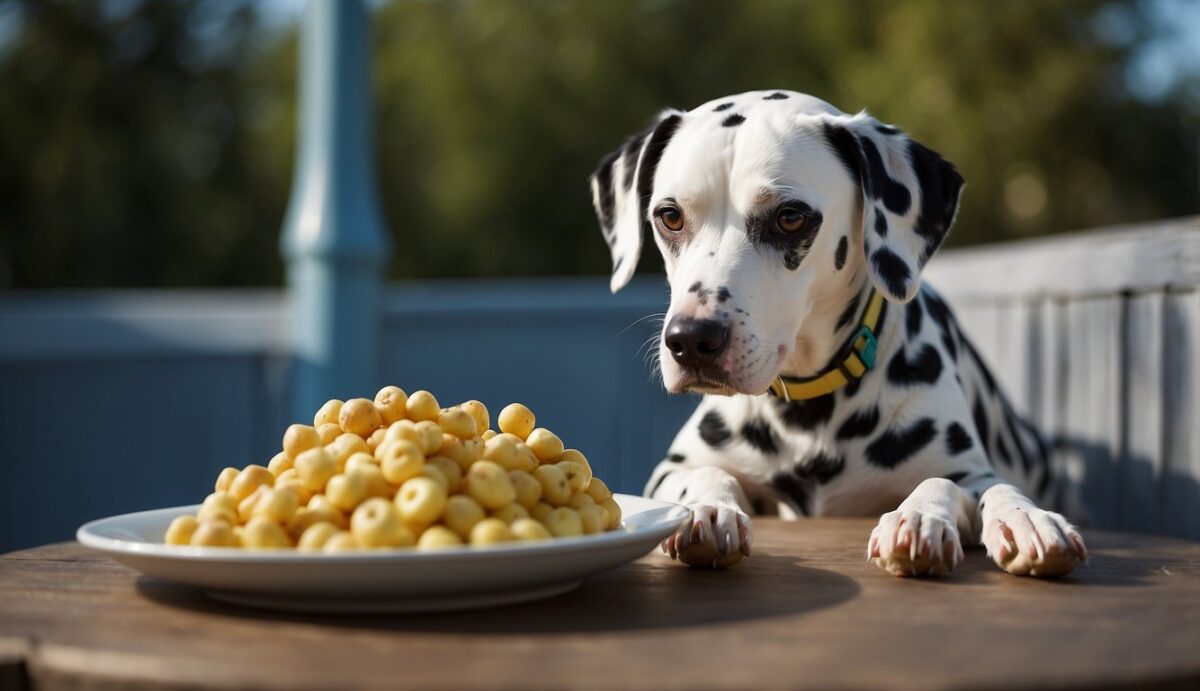Urinary stones, known as uroliths, can be a significant health concern for Dalmatians. This breed is at risk due to their unique urinary system. Recognizing the symptoms is crucial, as it can lead to severe complications if left untreated.
Symptoms typically include difficulty urinating, frequent attempts to urinate with little success, and possibly blood in the urine. If your Dalmatian is displaying such signs, prompt veterinary attention is essential to avoid a potentially life-threatening blockage.
Treatment usually involves dietary changes, increased water intake, and, in acute cases, surgical intervention. Since Dalmatians are predisposed to develop uric acid stones due to a genetic mutation, their diet should be carefully managed.
A diet low in purines, which are found in high-protein foods, can help prevent the formation of these stones. Fresh water should be readily available to encourage frequent urination, which helps flush out crystals before they grow into stones.
Key Takeaways
- Symptoms of urinary stones in Dalmatians include trouble urinating and blood in the urine.
- Treatment may involve dietary changes, increased hydration, and potentially surgery.
- Preventing stone recurrence is key and involves a low-purine diet and ensuring adequate water intake.
Understanding Urinary Stones in Dalmatians

When it comes to understanding urinary stones in Dalmatians, you’re looking at a breed-specific health concern. The formation of urinary stones, particularly urate stones, is a serious issue, influenced by genetic factors and specific risk elements.
Types of Urinary Stones
Urinary stones in Dalmatians are typically classified as urate stones. These stones are composed of uric acid, a substance that Dalmatians have trouble converting into a more soluble form due to a genetic mutation.
Causes and Risk Factors
The primary cause of urate stone formation in Dalmatians is a genetic mutation in the SLC2A9 gene. This mutation hinders the conversion of uric acid to allantoin, a process crucial for the ultimate excretion of uric acid. When uric acid cannot be adequately dissolved, it may lead to the formation of crystals and stones in the urinary tract.
- Risk Factors:
- Gender: Males are more prone to urethral obstruction due to their longer and narrower urethra.
- Dehydration: Limited water intake can increase the concentration of urine and uric acid.
- Diet: Foods with high purine content can lead to higher uric acid levels.
Recognizing Symptoms and Signs of Urinary Stones
If your Dalmatian is affected by urinary stones, you may observe the following symptoms:
- Frequent attempts to urinate with little success
- Painful urination or vocalization during urination
- Blood in the urine
- Lethargy
- Loss of appetite
The Role of Genetics in Urinary Stone Formation
Dalmatians inherit a unique urinary system, predisposing them to urate stone formation due to a genetic mutation affecting uric acid metabolism. While not all Dalmatians will develop stones, those with this mutation cannot process certain waste products normally, leading to a higher risk of stone formation.
Diagnosing Urinary Stones in Dalmatians

When you suspect that your Dalmatian might have urinary stones, a prompt and accurate diagnosis is crucial. Here are the steps your veterinarian will take to confirm the condition.
Veterinary Examination
Initially, your veterinarian will conduct a thorough physical examination of your Dalmatian. You might be asked about your dog’s symptoms, such as difficulty urinating, blood in the urine, or any unusual behavior. The vet will look for any signs of discomfort or pain, especially around the abdominal area, which may indicate the presence of stones.
Diagnostic Imaging Techniques
For a detailed view of what’s happening inside your Dalmatian’s urinary tract, your vet may use various imaging techniques:
- X-rays (Radiography): This is a common method that can reveal the size and location of urinary stones.
- Ultrasound: Ultrasounds are useful for detecting stones that X-rays might miss and can also give insights into the condition of the bladder and kidneys.
Urinalysis and Laboratory Tests
Lastly, your veterinarian will perform a urinalysis to check for the presence of crystals, blood, or infection in the urine. This is a key diagnostic tool that also helps to determine the composition of the stones. Additional laboratory tests might be ordered to assess kidney function and overall health, guiding the treatment plan.
Treatment Options for Dalmatians with Urinary Stones

As a Dalmatian owner, it’s essential to understand the treatment options available for urinary stones, a condition your pup may face. Timely intervention can prevent complications and ensure your dog’s health and comfort.
Emergency Treatment and Stabilization
If your Dalmatian is experiencing a urinary blockage, immediate veterinary attention is required to stabilize the situation. Your vet may perform a cystocentesis—a procedure to remove urine from the bladder using a needle, which provides immediate relief. They could also insert a catheter to help remove the blockage if your dog is unable to urinate.
Surgery and Non-Surgical Procedures
For stones that cannot be passed or dissolved, surgery might be necessary. A common surgical procedure known as a cystotomy involves making an incision in the bladder to remove the stones. In some cases, non-surgical options such as dietary dissolution or lithotripsy—breaking down stones using ultrasonic waves—may be considered.
Medications and Supplements
Your vet may prescribe medications aimed at dissolving the stones or preventing their formation. Allopurinol is often used to decrease uric acid production, while potassium citrate can help reduce the formation of urate crystals by alkalinizing the urine. Always follow your veterinarian’s dosage recommendations closely.
Dietary Management and Prescription Diets
A prescription diet is crucial for managing and preventing urinary stones in Dalmatians. These diets are formulated to promote a more dilute urine, which helps to dissolve certain types of stones and reduces recurrence. Look for diets low in purines, as purines can contribute to urate stone formation in Dalmatians.
The Importance of Diet in Managing Urinary Stones

In Dalmatians, the risk of forming urinary stones can be significantly reduced with dietary adjustments. Ensuring you provide a diet suited to your Dalmatian’s needs can help manage and prevent the formation of these painful stones.
Formulating a Proper Diet
Your Dalmatian requires a precise balance of nutrients to both reduce the risk of urinary stones and maintain overall health.
Protein intake should be monitored closely, since high-purine proteins can increase urate, the material that often comprises stones in this breed. It’s particularly important to select a diet that is low in purines, which means avoiding organ meats and some types of seafood.
Increasing water consumption is crucial. You should encourage your Dalmatian to drink plenty of water to dilute the urine, which minimizes the concentration of stone-forming substances. Some diets might include supplements that alter the pH of the urine, making it less conducive to stone formation.
Foods to Avoid
To minimize the risk of stone formation in your Dalmatian, certain foods must be avoided or limited. Here’s a quick list:
- High-purine meats: Organ meats like liver and game meats
- Certain fish: Anchovies, sardines, mackerel, and herring
- Yeasty foods: Beer and bread with high yeast content
It’s not just about what to limit, but also about balancing the diet. Inclusion of lower-purine alternatives like eggs and cottage cheese, along with a controlled portion of higher quality protein, can help manage the urate levels in your dog’s urine.
Preventing Recurrence of Urinary Stones

Managing your Dalmatian’s health involves proactive steps to prevent the recurrence of urinary stones. It is crucial to maintain proper water consumption, make dietary adjustments, and ensure regular veterinary care.
Increasing Water Intake
Water is essential in reducing the risk of stone formation. Encouraging your Dalmatian to drink more can dilute the urine, which helps prevent crystals from clumping together into stones.
- Make water available: Always have fresh water for your dog.
- Multiple bowls: Place water bowls in various locations.
- Wet food: Incorporate wet food into their diet to increase hydration.
Lifestyle and Dietary Adjustments
Your Dalmatian’s diet plays a significant role in managing and preventing urinary stones.
- Low-purine diet: Choose foods that are lower in purines which contribute to urate stone formation.
- Monitor protein intake: A high-quality diet with controlled protein levels can help manage urine pH levels.
- Balance: Ensure a balanced diet to support overall health.
Living with a Dalmatian with Urinary Stones
Caring for your Dalmatian with urinary stones requires daily vigilance. You must also thoroughly understand when an emergency situation is unfolding.

Daily Management and Care
Your daily routine will greatly influence your Dalmatian’s comfort and health. Key elements include:
- Hydration: Ensure constant access to fresh water to help dilute urine and potentially reduce crystal formation.
- Diet: Feed specialized diets that promote urinary health. Often, these are low in purines which contribute to stone formation.
- Medication: If prescribed, administer medications to manage urate levels reliably.
- Exercise: Regular, gentle exercise can encourage urination and help expel small crystals before they grow.
- Monitor urination: Observe frequency and comfort during your dog’s bathroom breaks. Look for any signs of straining or blood.
Understanding and Recognizing Emergencies
Recognizing an emergency early can save your Dalmatian’s life. Be on the lookout for:
- Sudden and frequent attempts to urinate with little to no output; this may indicate a blockage.
- Signs of severe discomfort, such as whimpering or restlessness during urination.
- Changes in behavior like lethargy or aggression which could signal pain.
If any of these occur, contact your veterinarian immediately. Urinary blockages can be life-threatening and require prompt attention.
Frequently Asked Questions

In this section, you’ll find answers to common questions about recognizing, treating, and managing urinary stones in your Dalmatian.
What are the signs that my Dalmatian might have urinary stones?
Your Dalmatian may exhibit signs such as difficulty urinating, bloody urine, or frequent attempts to urinate with little success. If you notice any of these symptoms, it’s vital to consult your vet immediately.
How can urinary stones in Dalmatians be treated?
Treatment for urinary stones in Dalmatians typically involves increased fluid intake, dietary changes, medication, or in severe cases, surgery to remove the stones.
Is there a specific diet recommended for Dalmatians with bladder stones?
Yes, a diet low in purines is usually advised for Dalmatians with bladder stones. This includes specially formulated foods that your veterinarian can recommend.
What homemade foods are beneficial for dogs with urate stones?
Homemade foods for dogs with urate stones should be low in purines. Ingredients like eggs, cottage cheese, and rice are commonly recommended, but always consult your vet for a tailored diet plan.
Which foods are known to exacerbate urate stone formation in dogs?
Foods high in purines such as organ meats, game meats, and some seafood should be avoided as they can worsen urate stone formation in dogs.
Are there any natural remedies to help dissolve bladder stones in dogs?
There are no well-documented natural remedies proven to dissolve bladder stones reliably.
It’s best to follow your vet’s advice. This may include certain supplements that can help manage stone formation.
